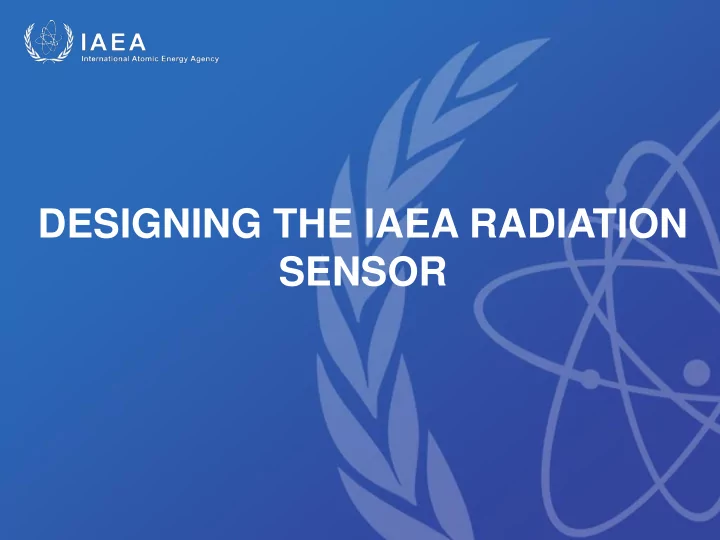

DESIGNING THE IAEA RADIATION SENSOR
Contents • General Approach to HW Design • CAD Tools Overview • Requirements for IAEA Radiation Sensor • BG51-SM in a Nutshell • Results of In house tests of BG51-SM • Sensor Schematic and PCB Presentation • Demo presentation
General Approach to HW Design
Main CAD Tools Overview Tools needed to produce HW: • Altium Designer, Xpedtion, Orcad Capture, Cadence Allegro Tools needed to program HW: • IAR, Keil, Eclipse
General Requirements Specification for IAEA Radiation Sensor • To be educational • To be easily designed and assembled • To demonstrate the basic design principles • To be cost effective
Basic Requirements Specification for IAEA Radiation Sensor • Detects beta and gamma radiation and X-rays • Low power requirement (100µA, 3.3 V) • Detector sensitivity: 5 cpm/µSv/h • High immunity to RF and electrostatic fields • Linear response over wide temperature range (0°C to 40°C)
BG51SM Radiation Sensor Elec. Characteristics • Specified at: VCC = 4.0V, TA = 25°C • Measurement range of dose rate: 0.1 µSv/h to 100 mSv/h • Pulse count rate: 5 cpm ± 15% for 1 µSv/h radiation dose rate • Energy response 50 KeV to above 2 MeV • Output pulse level: equal to supply voltage (positive going) • Output pulse width 50 μ s to 200 μ s (LOW→HIGH→LOW) • Supply voltage range: 2.5V to 15.0V • Supply current, IS 25µA • TYP Operating temperature range -20°C to 60°C
BG51SM Radiation Sensor Block Diagram
BG51SM Radiation Sensor Block Diagram
BG51SM Radiation Sensor Linearity
BG51SM Radiation Sensor In- house tests • Tests are needed to verify functionalities given in datasheet • Since such kind of sensors are very susceptible to noise in power supply, we tested firstly the proposed power supply filter provided in the datasheet • We found that the filter given in datasheet is not sufficent to provide “clean” power supply
BG51SM Radiation Sensor False Triggering
BG51SM Radiation Sensor False Triggering Zoomed In
BG51SM Radiation Sensor False Triggering Solution • Ripple in power supply has to be canceled • We used linear voltage regulator with high Power Suply Rejection Ratio (PSRR) + filtering + proper Printed Circuit Board (PCB) layout • We were able to cancel power supply ripple to only 2mV p-p
IAEA Radiation Sensor Schematic
IAEA Radiation Sensor Layout
IAEA Radiation Sensor 3D Model
IAEA Radiation Sensor Connection to Host Board • It should be connected to General Purpose Input Output (GPIO) pin, which can be configured to interrupt the processor on the rising edge of the TTL signal:
Conclusion • General approach to designing of Printed Circuit Board is presented • Brief overivew of CAD tools used in the industry is given • Radiation sensor used in the design is presented as well as its characteristics • Problems and solutions during development phase are depicted
Thank you!
Recommend
More recommend